New Mexico nursing home background checks combine federal CMS requirements with state-specific screening regulations. This creates a multi-layered compliance framework that facilities must navigate to maintain licensure and ensure resident safety. This comprehensive guide addresses the intersection of FBI fingerprinting, state registry verifications, and ongoing monitoring obligations specific to long-term care facilities operating under New Mexico's regulatory environment.
Key Takeaways
- New Mexico nursing homes must conduct FBI fingerprint-based background checks for all direct care staff before patient contact, as mandated by both federal CMS regulations and state licensing requirements.
- The New Mexico Department of Health requires enrollment verification through the Nurse Aide Registry and abuse registry checks across all states where applicants have lived in the past five years.
- Healthcare facilities face lookback periods extending to seven years for criminal history reviews, with disqualifying offenses including violent crimes, theft, abuse, and drug-related felonies.
- Long-term care background checks in New Mexico must be renewed every four years for certified nursing assistants and whenever staff transfer between facilities or change employment status.
- Conditional hiring is permitted under federal law, allowing employees to begin work under direct supervision while awaiting final FBI results, but state-specific restrictions may apply.
- Assisted living facilities and skilled nursing homes share similar background check requirements but differ in credentialing timeframes and acceptable alternative screening methods.
- Non-compliance with New Mexico nursing home staff verification protocols results in civil penalties ranging from $5,000 to $25,000 per violation, plus potential license suspension.
- Streamlined background check processes using integrated screening platforms reduce time-to-hire by 40-60% while maintaining full regulatory compliance and audit readiness.
Understanding New Mexico's Layered Background Check Requirements
New Mexico nursing home facilities operate under a dual regulatory framework. This framework combines federal Centers for Medicare & Medicaid Services (CMS) standards with state-specific Department of Health requirements. The layered compliance structure affects every aspect of staff screening, from initial application review through ongoing employment monitoring.
The complexity increases because New Mexico references multiple statutory authorities governing long-term care background checks. Federal law establishes baseline standards through the National Background Check Program (NBCP). Meanwhile, state regulations in the New Mexico Administrative Code add supplementary screening layers. Facilities must satisfy both regulatory tiers simultaneously, meaning the more stringent requirement always takes precedence when standards conflict.
For nursing home administrators, this translates to implementing screening protocols that exceed minimum federal standards. State-level regulations often specify additional disqualifying offenses, extended lookback periods, and expanded registry checks beyond what CMS requires. The practical implication is that New Mexico facilities cannot simply adopt a generic national screening template—they need state-specific compliance frameworks.
Federal CMS Background Check Mandates
The Centers for Medicare & Medicaid Services established comprehensive background check requirements through Section 6201 of the Affordable Care Act. This legislation created the National Background Check Program for long-term care facilities. These federal regulations apply uniformly across all states, creating a compliance floor that New Mexico facilities must meet as a baseline requirement.
CMS mandates include several critical screening components that form the foundation of compliant background check programs:
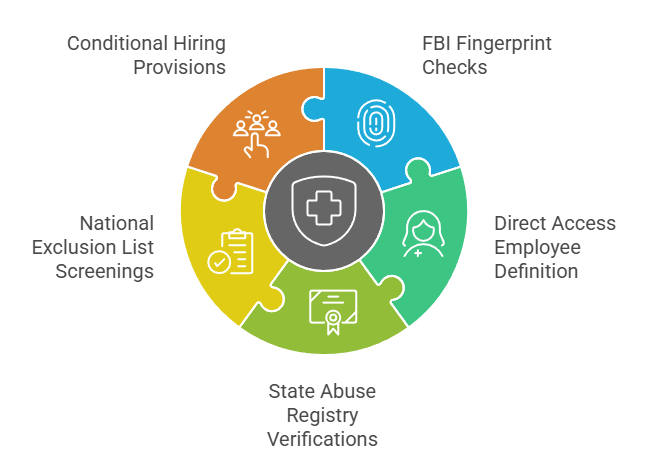
- FBI fingerprint-based criminal history checks: Provides definitive identity confirmation and access to the most comprehensive national criminal database available.
- Direct access employee definition: Applies broadly to nurses, certified nursing assistants, therapists, dietary staff, housekeeping personnel, and any contractor or volunteer entering resident care areas.
- State abuse registry verifications: Requires checking abuse and neglect registries to identify substantiated findings that may not appear in criminal records.
- National exclusion list screenings: Mandates verification against OIG, GSA, and other federal exclusion databases to prevent hiring individuals barred from healthcare program participation.
- Conditional hiring provisions: Permits provisional employment under continuous direct supervision while awaiting final FBI results, with documented supervision protocols and immediate termination requirements.
Facilities using conditional hiring must maintain detailed records demonstrating compliance with supervision requirements throughout the interim period. This provisional employment option carries significant audit risk when implemented incorrectly.
New Mexico State-Specific Requirements
New Mexico's Department of Health imposes additional screening requirements through regulations governing healthcare facility licensure and the Nurse Aide Registry system. State law mandates background checks that examine criminal history across all jurisdictions where applicants have resided during the past five years. This multi-state verification requirement significantly expands the scope of investigation beyond federal minimums.
The state's supplementary background check requirements include several mandatory components:
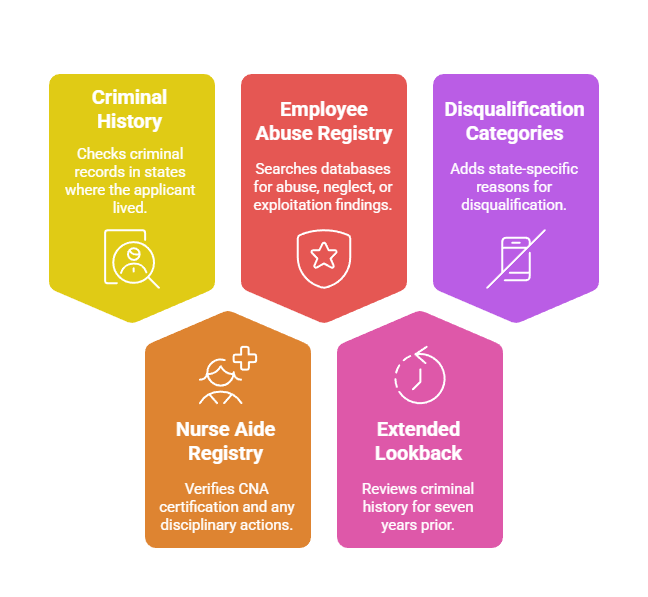
- Multi-state criminal history searches: Verification required in every jurisdiction where applicants lived during the preceding five years.
- Nurse Aide Registry verification: Confirms active CNA certification, identifies substantiated findings of abuse or neglect, and reveals disciplinary actions.
- Employee Abuse Registry checks: Searches state databases tracking findings of abuse, neglect, or exploitation in healthcare settings regardless of whether criminal charges were filed.
- Extended lookback provisions: Applies seven-year lookback periods for criminal history reviews, calculated from conviction date or release from incarceration.
- Enhanced disqualification categories: Adds state-specific permanent disqualifiers beyond the federal list, including certain drug trafficking offenses and repeat DWI convictions.
These state-specific layers transform New Mexico's background check requirements into one of the more comprehensive frameworks in the nation. Facilities must implement robust multi-component screening systems that address both federal and state mandates simultaneously.
Components of a Complete New Mexico Long-Term Care Background Check

A compliant New Mexico nursing home background check comprises multiple verification components. Each component addresses different risk categories and regulatory requirements. Healthcare facilities must sequence these checks strategically to balance regulatory compliance with operational efficiency.
The typical screening package for long-term care staff includes seven core components that together create comprehensive risk assessment. These elements range from identity verification through criminal history analysis to professional credential validation. Missing even one required component can result in compliance violations during state surveys or CMS audits.
| Background Check Component | Regulatory Authority | Typical Turnaround Time |
| FBI Fingerprint Check | Federal CMS / State DOH | 3-14 business days |
| State Criminal History | New Mexico DOH | 1-3 business days |
| County Criminal Records | Best Practice Standard | 2-5 business days |
| Nurse Aide Registry | New Mexico DOH | Immediate to 24 hours |
| Employee Abuse Registry | New Mexico DOH | 1-2 business days |
| OIG/GSA Exclusion Lists | Federal CMS | Immediate |
| Multi-State Criminal Search | New Mexico DOH | 3-7 business days |
Processing times directly impact hiring velocity, making vendor selection and process design critical operational decisions. Facilities that integrate screening components through single-platform providers typically reduce total turnaround time by 30-50% compared to managing multiple vendor relationships.
FBI Fingerprint-Based Criminal History Checks
FBI fingerprint checks represent the gold standard for criminal background verification. They access the most comprehensive national database available. Unlike name-based searches that rely on matching personal identifiers, fingerprint-based checks provide definitive identity confirmation and eliminate the risk of false positives from similar names.
The fingerprinting process begins with electronic capture at authorized locations. These include many local police departments, private fingerprinting services, and some healthcare facilities with on-site capabilities. Digital fingerprints transmit to the FBI's Criminal Justice Information Services division, which searches records from federal agencies and participating state repositories.
When criminal records surface, facilities receive detailed information including charges, dispositions, sentencing, and case status. However, FBI reports don't include interpretation or hiring recommendations—that analysis falls to the employer. New Mexico facilities must evaluate criminal findings against state and federal disqualification standards.
New Mexico Nurse Aide Registry Verification
The New Mexico Nurse Aide Registry maintains comprehensive records for all certified nursing assistants who have completed state-approved training programs. Registry verification confirms that CNAs hold active certification, reveals any abuse findings or disciplinary actions, and documents training completion dates. This check is mandatory before hiring any employee who will perform nursing assistant duties.
Registry searches require the applicant's full legal name and may request additional identifiers like date of birth or certification number. The New Mexico Department of Health provides online registry access for employer verification, delivering immediate results in most cases. When registry records show adverse findings, facilities must obtain detailed documentation before making employment decisions.
Employee Abuse Registry and Multi-State Checks
New Mexico's Employee Abuse Registry tracks substantiated findings of abuse, neglect, or exploitation in healthcare settings. This registry captures incidents that resulted in administrative findings even when criminal charges weren't filed. Facilities must search this registry for all applicants, not just clinical staff, because abuse can occur in any role with resident access.
The multi-state check requirement extends background screening to every jurisdiction where applicants have lived during the preceding five years. This geographic expansion recognizes that limiting searches to New Mexico records creates dangerous gaps in risk assessment. Applicants who committed disqualifying offenses in other states would pass New Mexico-only checks, exposing facilities to preventable hiring errors.
Disqualifying Offenses Under New Mexico Law
New Mexico nursing home staff verification protocols identify specific offense categories that constitute absolute employment disqualifiers. This means facilities cannot hire applicants with these convictions regardless of mitigation factors. Both federal and state regulations define disqualifying offenses, with the more restrictive standard always controlling.
Federal law establishes baseline disqualifications including any felony conviction for crimes involving violence, abuse, neglect, fraud, theft, or controlled substances. State law expands this list to include additional offenses specific to healthcare settings and vulnerable populations. The lookback period extends seven years from conviction date or release from incarceration, whichever is later.
Conditional disqualifications allow individualized assessment for certain offense types. Facilities consider factors like rehabilitation evidence, time elapsed, and offense relevance to job duties. However, this discretionary analysis applies only to non-absolute disqualifiers.
Absolute Disqualification Categories
Federal CMS regulations identify specific offense categories that permanently disqualify individuals from employment in long-term care facilities with Medicare or Medicaid participation. These absolute disqualifiers represent the most serious offenses where no amount of time passage or rehabilitation evidence permits employment. Facilities cannot hire applicants with these convictions under any circumstances.
The permanent disqualification categories encompass a comprehensive range of serious criminal offenses:
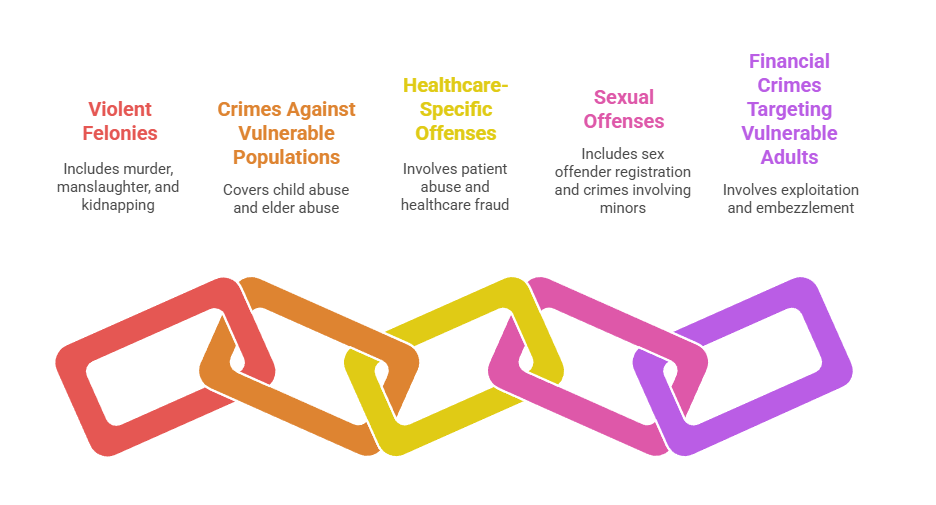
- Violent felonies: Murder, manslaughter, kidnapping, rape, sexual assault, robbery, and felonious assault.
- Crimes against vulnerable populations: Child abuse, elder abuse, domestic violence with serious injury, and exploitation of disabled individuals.
- Healthcare-specific offenses: Patient abuse in any setting, misappropriation of patient property, and felony-level healthcare fraud.
- Sexual offenses: Any conviction requiring sex offender registration, sexual assault, and crimes involving minors.
- Financial crimes targeting vulnerable adults: Exploitation, theft from patients or residents, and embezzlement in healthcare settings.
New Mexico state law adds supplementary permanent disqualifiers beyond the federal list. Facilities operating in New Mexico must apply the combined federal and state disqualification standards.
Conditional Disqualifications and Assessment Protocols
Conditional disqualifications require individualized assessment rather than automatic rejection. This allows facilities to evaluate whether specific applicants pose unacceptable risk despite criminal history. This category includes misdemeanor convictions, non-violent felonies outside the absolute disqualification list, and offenses occurring beyond the standard lookback period.
When conducting individualized assessments for conditional disqualifications, facilities must apply structured evaluation frameworks:

- Offense nature and severity: Evaluate whether the crime involved violence, deception, or harm to vulnerable individuals.
- Relationship to job responsibilities: Determine whether the offense directly relates to duties the applicant would perform.
- Time elapsed since offense: Calculate years since conviction and completion of sentence.
- Number and pattern of offenses: Distinguish between isolated incidents and patterns of criminal behavior.
- Rehabilitation evidence: Review completion of probation or parole, participation in treatment programs, and employment stability.
- Age at time of offense: Consider whether the applicant was a young adult when the offense occurred.
Documentation requirements for individualized assessments are substantial. Facilities must create written records explaining why they determined the applicant does or doesn't pose unacceptable risk.
Background Check Timing and Renewal Requirements
The timing of New Mexico nursing home background checks follows strict regulatory requirements. These requirements balance resident safety with operational practicalities. Federal law mandates completing background checks before allowing unsupervised patient contact, while state regulations specify exact timeframes for different check components.
Background check validity periods determine how long screening results remain acceptable before requiring renewal. New Mexico distinguishes between initial hire screenings and transfer verifications when employees move between facilities. The state also imposes recurring background check requirements for certain staff categories.
Conditional employment provisions allow limited flexibility in background check sequencing. However, facilities must carefully structure these arrangements to maintain compliance. Mismanaging conditional employment periods represents one of the most common violations cited during state surveys.
Pre-Employment Screening Timelines
New Mexico requires facilities to initiate all required background check components before employees begin work in any capacity involving resident access. This includes completing registry searches, submitting FBI fingerprint requests, and verifying credentials before the first work shift. While federal law permits conditional employment during the FBI processing period, state regulations may impose additional restrictions.
The practical challenge involves managing screening timelines that vary significantly across components. Registry checks and exclusion list searches return results within 24-48 hours. FBI fingerprint checks may require 3-14 business days depending on whether the applicant has criminal history. County-level criminal searches add another 2-5 days per jurisdiction searched.
Many New Mexico facilities adopt a phased screening approach where quick-return components like registry checks and database searches occur first. This sequencing identifies obvious disqualifiers early, preventing wasted investment in comprehensive screening for applicants who won't pass initial checks. However, no hiring decision should finalize until all required components return acceptable results.
Renewal and Transfer Requirements
New Mexico mandates background check renewals every four years for certified nursing assistants and certain other licensed healthcare professionals. These periodic rechecks ensure that employees haven't developed disqualifying criminal history or registry findings during employment. Facilities must track renewal dates for each employee and initiate updated screenings before certification periods expire.
When employees transfer between New Mexico long-term care facilities, receiving employers must verify that previous background checks were compliant and results remain current. This transfer verification process doesn't necessarily require completely new screenings if the prior facility conducted checks meeting current standards within the validity period. However, facilities must obtain documented evidence of the previous screenings and conduct supplementary checks for any components that weren't included or have expired.
Managing Conditional Employment and Provisional Hiring
Conditional employment provisions allow New Mexico nursing homes to address critical staffing shortages without compromising background check compliance. Federal regulations permit provisional hiring while awaiting final FBI results, provided facilities implement documented supervision protocols. This flexibility helps facilities maintain adequate staffing ratios during the typical 7-14 day FBI processing period.
However, conditional employment carries significant compliance risks when implemented incorrectly. Facilities must establish clear policies defining supervision requirements, document supervision activities continuously, and terminate provisional employees immediately if disqualifying information surfaces. State surveyors closely scrutinize conditional employment arrangements.
The decision to use conditional employment involves balancing operational benefits against administrative burdens. Facilities with robust compliance infrastructure can implement conditional hiring effectively. Smaller organizations with limited administrative resources may find the documentation requirements overwhelming.
Supervision Requirements During Conditional Employment
Federal regulations require that conditionally hired employees work under "continuous direct supervision" while awaiting final background check results. This supervision standard means that a fully screened, authorized staff member must maintain visual contact with the provisional employee during all interactions with residents. The supervisor must be close enough to intervene immediately if concerns arise.
Documentation requirements for conditional supervision are extensive. Facilities must maintain daily logs recording the provisional employee's name, supervisor's name, dates and times of supervised work, and specific tasks performed. These logs must be contemporaneous—meaning recorded during or immediately after the supervised activities. Many surveyors specifically request conditional employment documentation to verify supervision compliance.
The supervision requirement substantially increases labor costs because it dedicates one fully credentialed employee to oversight rather than independent resident care. This cost factor leads many facilities to limit conditional employment to positions where training benefits justify the supervision expense. For example, orienting a new registered nurse under supervision during the FBI wait period provides value beyond mere compliance.
Immediate Action Requirements When Disqualifying Information Surfaces
When background checks reveal disqualifying offenses, New Mexico facilities must terminate provisional employment immediately. This means literally upon receiving the disqualifying information. Regulations prohibit allowing the employee to complete their shift, work pending a formal termination meeting, or continue employment while appealing the background check findings.
Facilities must implement comprehensive protocols to manage this critical compliance requirement:
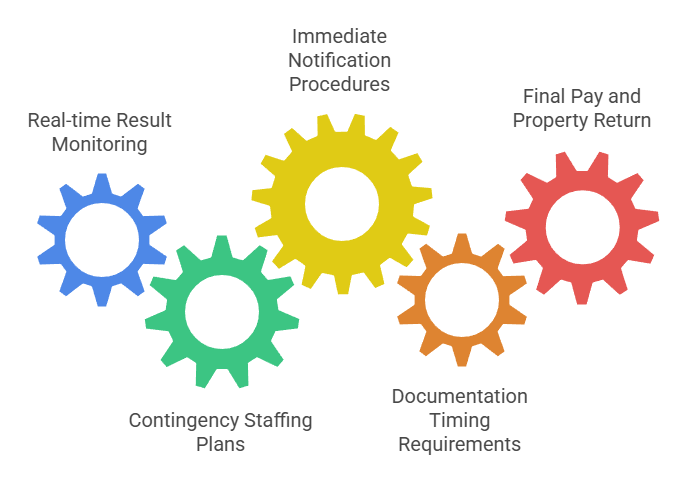
- Real-time result monitoring: Establish systems where background check results route immediately to designated HR personnel with authority to make termination decisions.
- Contingency staffing plans: Maintain on-call pools or float staff specifically for background check failures and other unexpected staffing gaps.
- Immediate notification procedures: Develop protocols for notifying provisional employees of termination decisions within minutes of receiving disqualifying results.
- Documentation timing requirements: Create written termination records the same day disqualifying information arrives, noting exact time results were received.
- Final pay and property return: Establish procedures for processing final paychecks, collecting facility property, and deactivating access credentials on an expedited basis.
This contemporaneous documentation proves the facility met its immediate action obligation. It protects against wrongful termination claims by demonstrating that decisions followed regulatory mandates rather than discriminatory intent.
Compliance Documentation and Audit Readiness
Maintaining comprehensive background check documentation represents a critical compliance obligation that extends far beyond the hiring decision. New Mexico regulations require facilities to retain background check records throughout employment and for specified periods after separation. These records must be immediately accessible during state surveys and CMS audits.
Documentation requirements encompass more than simply filing background check reports. Facilities must maintain audit trails showing when checks were initiated, what components were included, when results were received, and who reviewed findings. For conditional employment situations, documentation expands to include daily supervision logs and immediate termination records.
The practical challenge involves creating documentation systems that balance regulatory requirements with operational efficiency. Over-documentation consumes staff time and creates unnecessary administrative burden. Under-documentation exposes facilities to compliance violations.
Required Retention Periods and Record Organization
New Mexico requires facilities to retain background check documentation for a minimum of five years after employment ends. Many facilities adopt longer retention periods to align with general employment record requirements. Federal regulations impose similar timeframes under CMS conditions of participation.
Organization systems should separate background check documentation into distinct file sections including initial screening results, conditional employment records, renewal checks, and any individualized assessments. This structured organization allows surveyors to quickly locate specific documentation during audits without extensive searching. Many facilities use color-coded file systems or digital folders with standardized naming conventions.
Preparing for State Surveys and CMS Audits
State surveyors routinely examine background check compliance during annual licensing surveys and complaint investigations. Surveyors typically request documentation for recently hired employees, conditional employment cases, and staff in specific high-risk positions. Facilities should maintain current background check logs listing all employees, their hire dates, screening completion dates, and file locations.
Mock audits conducted internally before official surveys help identify documentation gaps and process weaknesses that could result in citations. During mock audits, compliance staff should randomly select employee files and verify that all required background check components are present, properly dated, and compliant with current standards. Any missing documentation discovered during mock audits can be remediated before official surveyors arrive.
Common documentation deficiencies cited during surveys include missing renewal checks for employees exceeding validity periods and absent registry verification printouts. Facilities can prevent most of these citations by implementing checklist-based verification systems that confirm documentation completeness before closing employee files. Pre-survey preparation should include reviewing all files created since the previous survey.
Streamlining Background Check Processes for Operational Efficiency
New Mexico nursing homes can achieve significant competitive advantages by implementing streamlined background check processes. These processes reduce time-to-hire while maintaining strict regulatory compliance. The average healthcare facility loses qualified candidates during lengthy screening periods, particularly in competitive labor markets where nursing professionals receive multiple offers.
Process optimization requires analyzing each component of the background check workflow to identify bottlenecks and inefficiencies. Common delay sources include manual data entry, sequential rather than parallel processing, and multiple vendor relationships requiring separate submissions. Addressing these bottlenecks through technology adoption typically reduces total screening time by 40-60% without compromising compliance.
The investment in screening process optimization delivers returns beyond faster hiring. Streamlined workflows reduce administrative labor costs, improve applicant experience, and minimize compliance errors. For facilities struggling with high vacancy rates or turnover, screening process improvements often represent the highest-impact HR intervention available.
Technology Solutions and Integrated Screening Platforms
Integrated background screening platforms consolidate multiple check components through single submission workflows. This dramatically reduces administrative complexity. Rather than submitting separate requests to FBI channelers, registry databases, county courts, and exclusion list providers, integrated platforms allow HR staff to order comprehensive screening packages through unified interfaces.
Modern integrated screening solutions provide multiple features that streamline the entire background check process:
- Single-submission workflows: HR staff complete one form to order all required components simultaneously.
- Applicant self-service portals: Candidates initiate their own background checks, submit required documents, and schedule fingerprinting appointments.
- Real-time status tracking: Dashboard interfaces display current status for each screening component.
- Automated compliance tracking: Systems monitor renewal dates and generate alerts before screening expirations.
- Integration with HRIS and ATS: Seamless data flow from applicant tracking systems through background checks to final onboarding.
- Mobile fingerprinting coordination: Platforms schedule mobile technicians for on-site fingerprinting or direct candidates to nearby collection sites.
These technology investments typically achieve ROI within 12-18 months through reduced administrative labor and faster staff onboarding. Integration with applicant tracking systems and HRIS platforms creates seamless data flow from initial application through final hiring decision.
Best Practices for Reducing Time-to-Hire
Parallel processing—conducting multiple background check components simultaneously rather than sequentially—represents the single highest-impact strategy for reducing overall screening time. Rather than waiting for FBI results before initiating registry checks, facilities should launch all components on the same day. This parallel approach transforms multi-week sequential timelines into significantly shorter concurrent processes.
Facilities can implement several proven strategies to compress background check timelines:
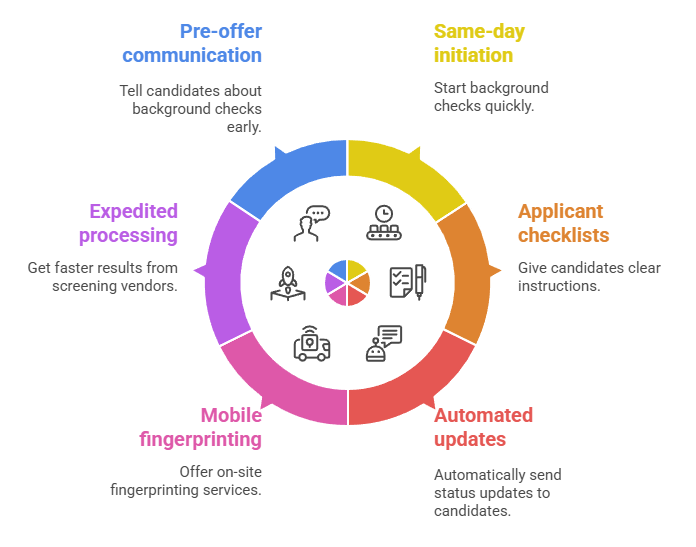
- Same-day initiation protocols: Launch all background check components within 24 hours of conditional offer acceptance.
- Detailed applicant checklists: Provide comprehensive guidance explaining exactly what candidates need to complete and where to obtain required documents.
- Automated status communications: Send candidates automatic updates when each screening component completes or when additional information is needed.
- Mobile fingerprinting services: Partner with vendors who dispatch technicians to conduct on-site fingerprinting during new hire orientation.
- Expedited processing partnerships: Negotiate priority processing agreements with screening vendors for rush results on critical positions.
- Pre-offer screening communication: Inform candidates during interviews about upcoming background check requirements so they can gather necessary documents before conditional offers.
Clear applicant communication about background check requirements and timelines reduces delays from missing information or incomplete submissions. Strategic fingerprinting partnerships with mobile providers eliminate the need for candidates to locate and travel to fingerprinting locations independently.
Conclusion
New Mexico nursing home background checks require navigating complex intersections of federal CMS requirements and state-specific regulations. Facilities that understand both regulatory layers and implement complete screening protocols achieve full compliance while minimizing operational burden. The investment in robust background check infrastructure protects vulnerable residents and satisfies regulatory obligations. Staying current with evolving requirements through ongoing compliance monitoring ensures that screening protocols remain effective as regulations continue developing throughout 2025 and beyond.
Frequently Asked Questions
What background checks are required for New Mexico nursing home employees?
New Mexico nursing homes must conduct FBI fingerprint-based criminal history checks, state criminal record searches, Nurse Aide Registry verification, Employee Abuse Registry checks, and OIG/GSA exclusion list screenings. Multi-state criminal searches covering all jurisdictions where applicants lived during the past five years are also required. These requirements apply to all staff with direct resident access, including nurses, CNAs, therapists, dietary staff, housekeeping personnel, and contractors.
How long do background checks take for nursing home jobs in New Mexico?
Complete New Mexico long-term care background checks typically require 7-14 business days, with FBI fingerprint results being the longest component at 3-14 days. Registry verifications and exclusion list searches return results within 24-48 hours, while county criminal record searches take 2-5 days per jurisdiction. Facilities using integrated screening platforms and parallel processing typically achieve faster overall timelines.
Can nursing homes hire employees before background checks are complete?
Federal regulations permit conditional employment while awaiting final FBI results, provided employees work under continuous direct supervision by fully screened staff members. New Mexico facilities using provisional hiring must maintain detailed daily supervision logs and terminate conditional employees immediately if disqualifying information surfaces. State-specific restrictions may limit conditional employment options, and facilities must complete registry checks before allowing any resident contact.
What disqualifies someone from working in a New Mexico nursing home?
Absolute disqualifications include felony convictions for violent crimes, abuse, neglect, exploitation, sexual offenses, robbery, kidnapping, and healthcare fraud. Additional permanent bars include substantiated findings of patient abuse in any healthcare setting and inclusion on federal exclusion lists. The lookback period extends seven years from conviction or release from incarceration, whichever is later, though certain offense types result in lifetime employment prohibition.
How often must nursing home background checks be renewed in New Mexico?
New Mexico requires background check renewals every four years for certified nursing assistants and certain licensed healthcare professionals. Facilities must also conduct updated screenings whenever employees transfer between long-term care facilities or return to employment after breaks exceeding the validity period. Tracking renewal dates and initiating updated checks before expiration is essential for maintaining continuous compliance.
What is the New Mexico Nurse Aide Registry and how does it affect employment?
The New Mexico Nurse Aide Registry maintains records of all certified nursing assistants, including certification status, training completion, and any substantiated abuse findings or disciplinary actions. Facilities must verify that CNAs appear on the registry with active certification and no disqualifying findings before employment begins. Registry verification serves dual purposes as both credential verification and abuse screening, capturing healthcare-specific misconduct that may not appear in criminal databases.
Do assisted living facilities have the same background check requirements as nursing homes?
New Mexico assisted living facilities and skilled nursing homes share similar background check requirements under Department of Health regulations, including FBI checks, registry verifications, and abuse registry searches. Specific credentialing timeframes and acceptable alternative screening methods may differ based on facility licensure type and services provided. Both facility types must comply with federal CMS requirements if they participate in Medicare or Medicaid programs.
What are the penalties for non-compliance with New Mexico nursing home background check laws?
Non-compliance with background check requirements results in civil penalties ranging from $5,000 to $25,000 per violation during state surveys. Serious or repeated violations can trigger license suspension, conditional licensure, or mandatory plans of correction with heightened oversight. Facilities may also face federal sanctions including Medicare/Medicaid termination if CMS identifies non-compliance during certification surveys.
Additional Resources
- New Mexico Department of Health - Health Facility Licensing and Certification
https://www.nmhealth.org/about/phd/phhsb/hflc/ - Centers for Medicare & Medicaid Services - National Background Check Program
https://www.cms.gov/medicare/provider-enrollment-and-certification/surveycertificationgeninfo/national-background-check-program - New Mexico Nurse Aide Registry Search
https://nmnar.hdmaster.com/nursesearch/search.jsp - U.S. Department of Health and Human Services - Office of Inspector General Exclusion List
https://oig.hhs.gov/exclusions/index.asp - New Mexico Administrative Code - Long Term Care Facility Requirements
https://www.srca.nm.gov/parts/title07/07.009.0002.html
Still have questions?
Get in touch with our team today for a personalized demo and discover how our tailored volume pricing and packages can drive results for your business!
How useful was this page?*
Note: your comments are anonymous. We use them to improve the website. Do not include any personal details.
Visit our FCRA Compliance Tool or leave a message here if you need a response.
From the blog Explore the GCheck Content Hub

Healthcare Background Check Requirements by State: A 2026 Operational Guide
14 Jan, 2026 • 18 min read
DUI Employment Restrictions by Industry: Complete 2026 Guide
14 Jan, 2026 • 19 min read
Financial Sector Background Checks: Navigating the 2026 Screening Landscape
13 Jan, 2026 • 18 min readThe information provided in this article is for general informational and educational purposes only and should not be construed as legal advice or a substitute for consultation with qualified legal counsel. While we strive to ensure accuracy, employment screening laws and regulations—including but not limited to the Fair Credit Reporting Act (FCRA), Equal Employment Opportunity Commission (EEOC) guidelines, state and local ban-the-box laws, industry-specific requirements, and other applicable federal, state, and local statutes—are subject to frequent changes, varying interpretations, and jurisdiction-specific applications that may affect their implementation in your organization. Employers and screening decision-makers are solely responsible for ensuring their background check policies, procedures, and practices comply with all applicable laws and regulations relevant to their specific industry, location, and circumstances. We strongly recommend consulting with qualified employment law attorneys and compliance professionals before making hiring, tenant screening, or other decisions based on background check information.

